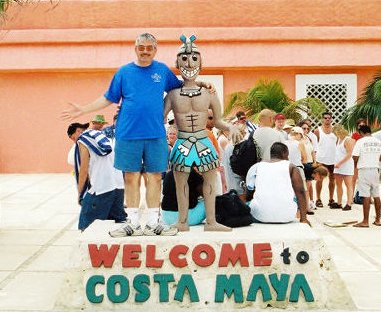Thursday, June 30, 2005
understand-learn-explore-communicate-but don't click it
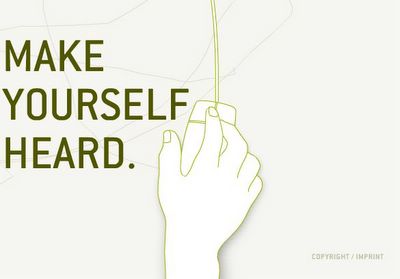
click it 
Whatever you do, don't click it... please
Wednesday, June 29, 2005
How to paint your shoes (diamonds optional)
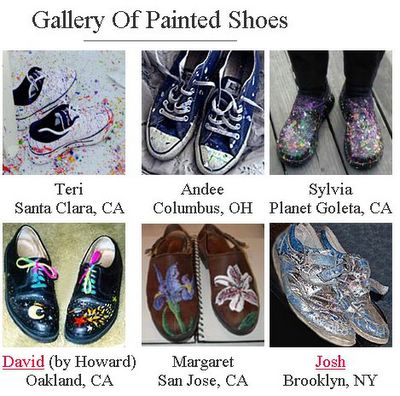
Gallery of Painted Shoes 
Howard Rheingold gives a tutorial on how to paint your shoes!"People will ask: 'Are you an artist?' to which I encourage you to say: 'Yes! And we can ALL be artists!' then evangelize your admirers to paint their own shoes. Be sure to add that it signifies nothing more than your willingness to paint your shoes. Isn't it a little weird that there are billions of shoes in the world and 99.99% of them are black or brown?"
How To Paint Your Shoes
diamonds 
Lindsay takes it further with an very creative photo interpretation of Paul Simon's "Diamonds on the Soles of Her Shoes"
Intro
She's a rich girl
she don't try to hide it
diamonds on the soles of her shoes.
he's a poor boy
empty as a pocket, empty as a pocket
with nothing to lose
ta na na na
she got diamonds on the soles of her shoes
People say she's crazy
she got diamonds on the soles of her shoes
well thats one way to lose these walking blues
diamonds on the soles of her shoes.
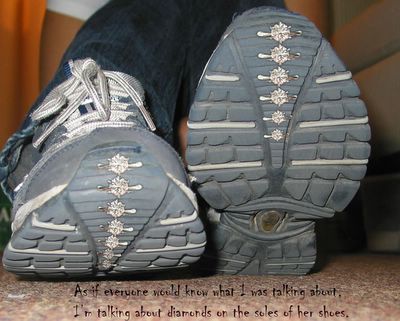
diamonds 2

Visit Lindsey's creative use of a diary / photos here!
Here's what I hear you saying...

Communication 
"An open ear is the only believable sign of an open heart."
--David Augsburger
A friend and I were discussing the other day about the art of listening. I cited a former colleague of mine - Chuck Lane, one of the original four who made up the founding core team of Promise Keepers. Whenever I needed to talk to Chuck, he would turn around, give me his full attention and listen to what I had to share at that time. And it could be anything - relationships, ministry oppurtunities, my regional staff team members... what consistently got my attention was, "Kerry, here's what I hear you saying..." Chuck wanted to make sure he heard me fully, before he would respond with his answer!
And being one of the core leaders (Bill McCartney, Dave Wardell, Dan Schaffer) the culture of listening and frequent use of the phrase "Help Me Understand" was ingrained deep in our team culture at Promise Keepers. During 1995 when I joined the staff of Promise Keepers, there was quite a diversity of people, and ethnicity; Asian, African American, Hispanic, Native American, Jewish, deaf and in a men's ministry, women were serving in key leadership positions as well. If we didn't understand each other, then it would be difficult to convey a message of unity to the constituents of men we were reaching at stadium events!
Good listening is like tuning in a radio station. For good results, you can listen to only one station at a time. Trying to listen to my wife while looking over an office report is like trying to receive two radio stations at the same time. I end up with distortion and frustration. Listening requires a choice of where I place my attention. To tune into my partner, I must first choose to put away all that will divide my attention. That might mean laying down the newspaper, moving away from the dishes in the sink, putting down the book I’m reading, setting aside my projects.
SOURCE: Robert W. Herron, Homemade, June 1987
A dozen wisdom nuggets on listening:
"Many a man would rather you heard his story than granted his request."
— Phillip Stanhope, Earl of Chesterfield
"Let a fool hold his tongue and he will pass for a sage."
—Publilius Syrus , First Century BC, Maxim 914
"Effective questioning brings insight, which fuels curiosity, which cultivates wisdom."
— Chip Bell
"We should never pretend to know what we don't know, we should not feel ashamed to ask and learn from people below, and we should listen carefully to the views of the cadres at the lowest levels. Be a pupil before you become a teacher; learn from the cadres at the lower levels before you issue orders." — Mao Tse-tung
"The most basic of all human needs is the need to understand and be understood. The best way to understand people is to listen to them."
— Ralph Nichols
"Effective listeners remember that "words have no meaning - people have meaning." The assignment of meaning to a term is an internal process; meaning comes from inside us. And although our experiences, knowledge and attitudes differ, we often misinterpret each other’s messages while under the illusion that a common understanding has been achieved."
— Larry Barker
"Bore, n.: A person who talks when you wish him to listen."
— Ambrose Bierce
"It’s a rare person who wants to hear what he doesn't want to hear."
— Dick Cavett
"One friend, one person who is truly understanding, who takes the trouble to listen to us as we consider a problem, can change our whole outlook on the world."
— Dr. E. H. Mayo
"There is no such thing as a worthless conversation, provided you know what to listen for. And questions are the breath of life for a conversation."
— James Nathan Miller
"Man's inability to communicate is a result of his failure to listen effectively."
— Carl Rogers
hearing vs. listening (hello McFly?)
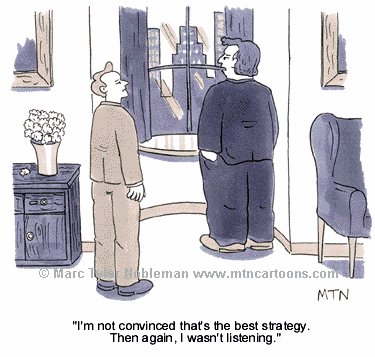
listening? 
Listen up! Prolific writer Melissa Shaw, Managing Editor, Network World Fusion writes a much needed management strategy (life skills) article on hearing vs. listening. Read on -When it comes to the similarities between listening and hearing, the only one is you use your ears for both. After that, they’re very different. For instance, have you ever had an employee come in your office and you’re on the computer? You’re busy, you’ve got stuff to do, so while they stand there and talk to you, your body is facing the computer, your eyes are on the computer and an ear, or maybe two, is devoted to the poor soul on the other side of your desk.
Aside from the abominable body language you’re displaying (“What I’m doing on the computer is more important than you”) you’re probably not really listening to what the person’s telling you.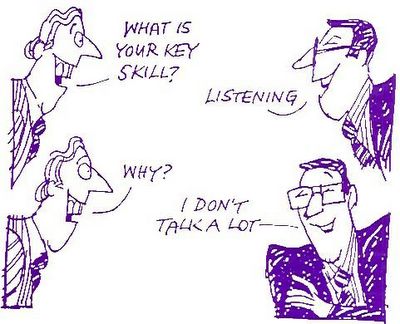
I hear you 
...after your employee (or anyone, for that matter) speaks, try to recap what the person said, making it clear you’re just trying to ensure you really understood what they were trying to say. He suggests something like, “Here’s what I’ve heard you say, tell me what I may have heard inaccurately.” By showing your employees you’re truly listening to them, you’re really building - or reinforcing - a terrific working relationship.
Hearing vs. listening
Questioning skills
Listen Openly Speak Honestly
Tuesday, June 28, 2005
The difference between hearing and listening
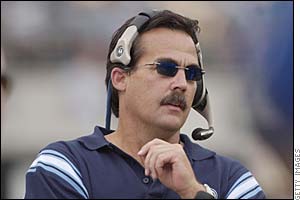
Coach Jeff Fisher, NFL Tennessee Titans 
When I am engaged in a mentoring relationship, I work hard at being intentional in listening AND understanding. Even of greater value is making an investment in with our loved ones -- re: my wife, son and daughter -- by truly listening and asking, "Help Me Understand." Three powerful words that show honor and places great value on what is being communicated. I know that as men, we are wired to always want to provide a solution without listening. Most of the time, our family aren't necessary looking for a solution; just a listening ear and a open heart. If we could truly grasp both skill sets of listening AND understanding exceedingly well, we will become rich in wisdom and relationships will flourish.
Here's a commentary from the University of Minnesota Student Handbook -Do you think there is a difference between hearing and listening? You are right, there is! Hearing is simply the act of perceiving sound by the ear. If you are not hearing-impaired, hearing simply happens. Listening, however, is something you consciously choose to do. Listening requires concentration so that your brain processes meaning from words and sentences. Listening leads to learning.
Good words of wisdom!
Most people tend to be "hard of listening" rather than "hard of hearing."
Now, let's enter Jeff Fisher's world.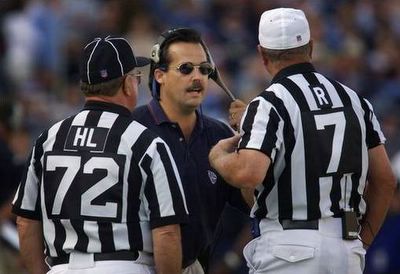
Titans Coach Jeff Fisher, center, was born without the canal in his right ear and is 90 percent deaf in that ear. 
"I have always been a proponent of listening, and the difference between hearing and listening. And hearing, 'I've got you coach,' where it goes in one ear and out the other, and listening where you really take the time to hear what's being said and concentrate and retain,' Fisher said.
A few years back Fisher invited a group of hearing-impaired children to meet with his players...."Even though the kids that came out and talked could not hear, they listened to every single thing that was said through their interpreter because their lives depend on their ability to listen rather than just hear. It was a great way of making the point to the players that you just can't take anything for granted."
link: Fisher at peace with quiet
The Bible talks about King Solomon: God gave Solomon wisdom and very great insight, and a breadth of understanding as measureless as the sand on the seashore. Solomon's wisdom was greater than the wisdom of all the men of the East, and greater than all the wisdom of Egypt...
The Bible addresses the value of listening: Proverbs 4:20 “My son, give attention to my words; Incline your ear to my sayings.”
Solomon appeals to his son to give attention – to pay attention – to give his words weight and value -and he will do this by opening his ears to listen carefully and thoughtfully to what he has to say which leads to the moral benefits of Wisdom as described in Proverbs 2:My son, if you accept my words
and store up my commands within you,
turning your ear to wisdom
and applying your heart to understanding
and if you call out for insight
and cry aloud for understanding,
and if you look for it as for silver
and search for it as for hidden treasure,
then you will understand the fear of the LORD
and find the knowledge of God.
For the LORD gives wisdom,
and from his mouth come knowledge and understanding.
Help me understand - I'm listening!
Monday, June 27, 2005
I want my MTV (still!)
Last week, Tomi Ahonen stopped by to speak to our team at a Motricity employee function. A fascinating and engaging speaker, this cat "is a bestselling author and independent consultant in the emerging areas of next generation wireless (who) lectures at Oxford University and is seen annually at about 20 telecoms on six continents."
Tomi Ahonen 
Part of his talk mentioned industries that will have a significant contribution to the "Mobile Internet" / "Mobile Portal Services" or "Wireless Services" / "Cellular Data Services" or "Value Add Services in Wireless"... in other words, there is ability to monitize a service such as MTV (Music Television) which immediately made me chuckle.
I caught up with Tomi Ahonen one on one later. A mention here - always get away with great minds - there is so much to take in drinking from a water fountain of knowledge, especially when that someone is a great listener and encourager like Tomi. Think about it - how often does one get to spend time with someone "...considered the global authority on making money with new wireless services, (who delivers) over 120 papers at industry conferences on six continents dealing with topics relating to 3G and advanced wireless services..." ???
We both laughed about his mention of MTV. Why? MTV will be 24 years old August 1 and carriers see a way to monitize MTV via cellphones. I shared a bit of history about MTV; way back in 1976, I was a long haired, T-Shirt and satin jacket wearing passionate music merchandiser and marketer for the record division of Warner Communications (WEA) which primarily was the the distribution, marketing and manufacturing arm for Warner Bros/Elektra/Atlantic Records for eight glorious years.
I wrote earlier in a post:
Music was really happening then, when Fleetwood Mac's Rumours was the all time best seller, Rod Stewart was sexy, Bob Marley was smokin! and Talking Heads, the Pretenders, Genesis, the Eagles, Rolling Stones and countless others were so innovative in their music. I was making the rounds with many bands, with my long haired flea bitten varmint coworkers to support the grassroots promotional efforts such as a new Irish band named U2 to local college stations and retailers to get some sales going.One of our sister companies (which included Warner Home Video, Atari, Warner Bros. Movies, D.C. Comics, Warner Books) was Warner Amex Cable (a joint venture between Warner Communications and American Express) who took the time to survey the market and QUICKLY fill a innovative need to sell music when pop radio decided that the public really needed just 10 songs to satisfy our musical tastes. From a marketing and merchandising perspective, we no longer had to be tied to radio for our success and promotion of artists.
Cassettes came on the scene, and it was a tough sell to convince retailers to reconfigure their shelves for this concept of portable music when 8 tracks were king. Then Sony came along in 1979 with the "Walkman" and music was never the same again!
That dinosaur thinking still exists today: witness the rise of iPods, satellite radio, mix tapes... With today's radio formats, one would think that Led Zeppelin only recorded one album, with one good song "Stairway to Heaven"!

mtv

"MTV (Music Television) is the oldest and most influential American cable network specializing in music-related programming. It was launched on August 1, 1981, with the words 'Ladies and gentlemen, rock and roll,' spoken on camera by John Lack, one of the creators of MTV. This introduction was immediately followed by the music-video clip Video Killed the Radio Star featuring a band called the Buggles. "
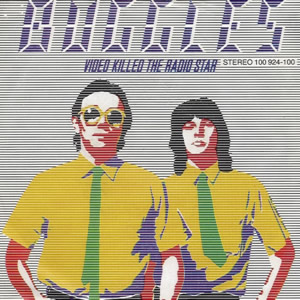
The Buggles

"The title proved somewhat prophetic as MTV greatly transformed the nature of music-industry stardom over the next several years. At the same time, MTV became a major presence in the cable-TV industry and in fact in the overall American cultural landscape.
One of the earliest and greatest cable success stories, MTV was established by Warner Amex Satellite Entertainment Company (WASEC) after extensive marketing research. The key to MTV's viability, at least initially, was the availability of low-cost programming in the form of music videos. Originally these were provided free by record companies, which thought of them as advertising for their records and performers. "
link
Entertainment Weekly ranked The Birth Of MTV as the sixth greatest moment in TV History.
Aug. 1, 1981 ...From the start, it was clear that everything about the cable upstart--its kinetic style-over-substance aesthetic, its kicky irreverence, its edgy antiauthoritarian bent--was designed not just to attract young viewers but to empower them with a new identity. Suddenly, they w eren't just teenagers, they were the MTV generation. (Of course, the task was difficult in those early days, given the lack of any actual programming. 'When we went on the air,' says Tom Freston, chairman and CEO of MTV Networks, who at the time was head of marketing, 'we had 168 clips. And 30 of them were Rod Stewart.')
The fallout was dramatic. 'I want my MTV!' quickly graduated from promotional slogan to teen rallying cry. Movies and TV shows soon began copying the network's quick-cut, impressionistic feel. Music began championing a new breed of rock star--video-friendly artists such as Michael Jackson, Madonna, and Duran Duran. It was a signal moment in pop-cultural history: For the first time, an entire generation could be defined not so much by their common beliefs but by the type of TV they watched. "
From: Entertainment Weekly
The 100 Greatest Moments in Television
Time Warner: Warner Bros and Warner Communications
I have kept the faith...
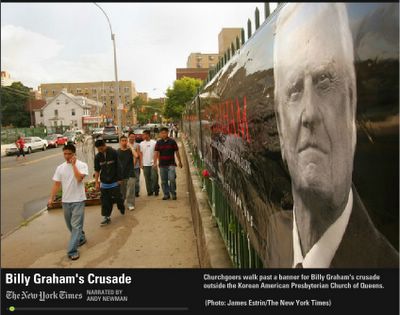
James Estrin/The New York Times 
On the Fox News Channel, Shawn Hannity was interviewing Rev. Billy Graham and asked, "How would you like to be remembered?" Rev. Graham's reply was, without hesitation, "I was faithful."
In speaking to the church leaders at Ephesus, the Apostle Paul tells them:However, I consider my life worth nothing to me, if only I may finish the race and complete the task the Lord Jesus has given me--the task of testifying to the gospel of God's grace. (Acts 20:24.)
Later, as Paul was finishing out his evangelistic crusades, he envision having crossed the "finish line."For I am already being poured out like a drink offering, and the time has come for my departure. I have fought the good fight, I have finished the race, I have kept the faith. Now there is in store for me the crown of righteousness, which the Lord, the righteous Judge, will award to me on that day--and not only to me, but also to all who have longed for his appearing. (2 Timothy 4:6-8)
Tim Krell writes, "Paul reminds us that he is not alone in the race. All of us are invited to run. Some will run fast, some will run slow, and some will not run at all. Some will engage in great training, some will not. Some will run the race unharmed, while others will suffer injuries along the way. Those who choose to run, like Paul, can look forward to receiving their "award" from God."
The New York Times writes: "[his sermon at Flushing Meadows] will almost certainly conclude Mr. Graham's remarkable run as the world's evangelist, having preached to more than 210 million people in over 185 countries and territories.
Among the evangelical faithful, talk has been bubbling for years about who might inherit Mr. Graham's mantle as America's spiritual leader, with everyone from his son, Franklin, to the mega-church pastor Rick Warren, author of the blockbuster bestseller, 'The Purpose Driven Life,' to T. D. Jakes, an African-American Pentecostal preacher, offered up as contenders.
But if history is any guide, it may be a long time before someone of Mr. Graham's stature emerges again. 'In a sense, no one takes their place,' said David E. Harrell Jr., a history professor at Auburn University, referring to evangelists who attained mountaintop status, like Mr. Graham, or those in history to whom he has been compared, including Dwight L. Moody, Charles G. Finney and George Whitefield."
Billy Graham, a Hard Act to Follow - New York Times
James Estrin/The New York Times
View the excellent audio slide show narrated by Andy Newman for the New York Times.
Sunday, June 26, 2005
Blog, Blog, Blog, Blog, Photoblog

www.outdoorandphoto.com/ Essays/Photographers/ 
How Photographers Are Making The Internet Work For Them
David B. Brooks, Shutterbug Magazine - January, 2005 "So, what is it about a blog, an individual journal of daily submissions of photographs, that has attracted so much participation? Part of it, I think, is inherent to the nature of people who are attracted to making pictures with a camera. Photographic enthusiasts tend to be rather individualistic-it is just you and your camera and it's definitely not a team sport. However, once a photograph is made, what do you do with it?
Rather than just filing pictures in shoe boxes once they are created, it is natural for most to want to share their view and perspective of the world, that dimension of reality and life they find interesting. A photoblog serves photo enthusiasts ideally to satisfy a need to "use" what they produce with a camera, in a free, individual, unstructured space that is open to all comers. Photoblogging is a low-cost, non-commercial, democratic "virtual gallery," and because it is a daily journal, it's ever changing with its attraction dynamic, always new and full of surprises for those who visit."
Read the rest of the article: shutterbug: David B. Brooks
Well said! Check out the Photography and Art links on the right nav bar - these photographers are diligent to post daily photos and you'll find them inspiring - a picture is indeed worth a thousand words.
I think a photography class should be a requirement in all educational programs because it makes you see the world rather than just look at it. - Author Unknown
Catchy Colors
How much did Judas really earn?

The Capture of Christ (detail)
Fresco Upper Church, San Francesco, Assisi 
From Ilan Volow’s Weblog
I wondered, how much did Judas really earn in today's money by betraying Jesus?
- The answer (with some help from ebible's weights and measurements section).
- 1 Roman denarius is equal to one's day wage for an agricultural worker. As most people in the ancient world were farmers, we can make some basic judgement about the standard of living a denarius could provide.
- 1 denarius = 1/4 Hebrew shekel. Thus, 1/4 Hebrew shekel was probably the going rate for your basic Jewish in Roman times (give or take).
- Judas was given 30 silver shekels to betray Jesus (Matt 26:15)
- 30 x 1/4 = 120. Thus, Judas was paid 120 days of an annual laborer's wage.
- 120 days is approximately 1/3 of a year
- The average annual income for the American worker is $36,764 (according to a 2002 report by the U.S. Bureau of Labor Statistics)
- 36764 * 0.333 (i.e. one third of 36764) = 12254.66.
Therefore, Judas betrayed Jesus in exchange for what is approximately $12,254 in today's currency. "
Saturday, June 25, 2005
Mounting a Billy Graham Crusade takes prayers, mailings and many, many chairs

The Rev. Billy Graham greets the crowd as he begins his last crusade last night in a park in Queens, N.Y. KNIGHT RIDDER 
If you want to get a glimpse of the logistical preparations behind a Billy Graham Crusade, here's a good article from the New York Times.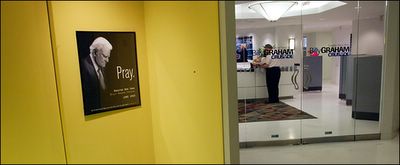
NY Crusade office 
Just like a Promise Keepers gathering, much work, planning, preparation, support from the local churches and a massive volunteer deployment starts with much prayer.
Things to consider? Here's a just a few of the pre-event things to plan for when I had a hand in coordinating stadium & arena events for when I served with the ministry of Promise Keepers (after the venue is secured). Keep in mind, it's ALL ABOUT TEAMWORK - delegating, coordinating, empowering, encouraging, building relationships and prayer, prayer and more prayer!
- Mass Transit plan
- Parking assignments
- Speaker & Staff Housing
- Handicapped and special needs
- Bus/RV parking
- Volunteer recruitment (800 to 3000 depending on arena/stadium)
- Production (staging, lighting)
- Clean up plan (leave the venue cleaner than when we moved in)
- Parking passes - ordered / received / assigned
- Move-In schedule (pallets of resources, food, Audio, Video)
- FM transmission (web broadcast, live feeds)
- Equipment list
- Golf carts
- Radios and language translation
- Port-A-Lets (outdoor events)
- Fork Lifts
- Crane
- Office equipment
Just for starters...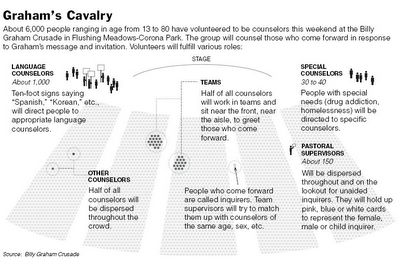
Seating logistics (click on image for larger view) 
A Billy Graham sermon is a model of simplicity and directness.
A Billy Graham crusade... is a decidedly more complex undertaking, requiring, oh, several million painstakingly assembled ingredients.
Like the five-tier usher organization chart, essential to helping the throngs of people expected at Flushing Meadows-Corona Park to find their seats.
Or the tactical wall map at crusade headquarters plastered with 1,424 red dots, one for each local church that worked for months to fill those seats.
Or the shelves of pink (for women) and blue (for men) binders crammed with the applications of the 6,000 volunteer counselors who will meet those who come forward to pledge their lives to Jesus.
None of these things will be on display... But they are all in place, along with the boxes of Bibles, the security checkpoints to be staffed by Cops for Christ and the Christian Law Enforcement Foundation, and, believe it, the arrangements for the pickup of each evening's offerings by an armored car.
However lofty the three-day crusade's spiritual goals, the worldly preparations for a huge religious event can be mighty impressive, too.
read more...
Faith and 70,000 Folding Chairs
Graham embarks on last crusade
Let's hear it for Hank!

Let's hear it for Hank! 
Tom Kuntz directs the long-awaited followup to Starbucks "Glen".
Starbucks/Hank
Dang it's hot! (History of the T-Shirt)

Arrrrrrrgh 1 
I am sweltering here in North Carolina under humid weather. Anything above 72 degrees is hot enough - it's the humidity, concrete and car exhaust that causes one's body to cool itself off.
Fashion wise, it's kinda nutty that one has to wear a T-Shirt underneath a polo shirt so that the perspiration doesn't soak the outer shirt. On the other hand, the cool thing about T-Shirts is the blank canvas one has to express themselves and "think out loud" from the crowd. Aren't we really just models in the various runways of life?
expression on the runway of life 
So how did the T-Shirt originate? "The American T-Shirt began during WWI when American troops noticed European soldiers wearing a comfortable and lightweight cotton undershirt during the hot and humid European summer days. Compared to the wool uniforms that the American soldiers wore, these undershirts were cooler and more comfortable and they quickly caught on with the Americans. Due to their simple design, these shirts became known in the USA as 'T' shirts or, as we know them now, 'T-Shirts'."
History of the T-Shirt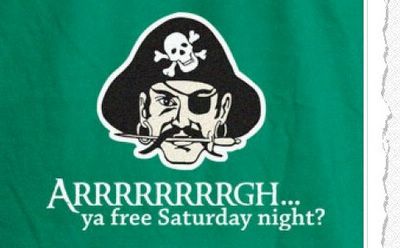
Arrrrrrrrgh... 
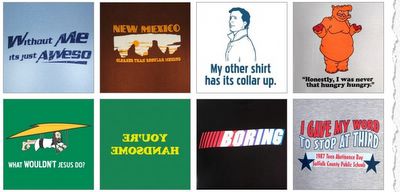
Jokes to wear... 
Busted Tees: Jokes you can wear!
